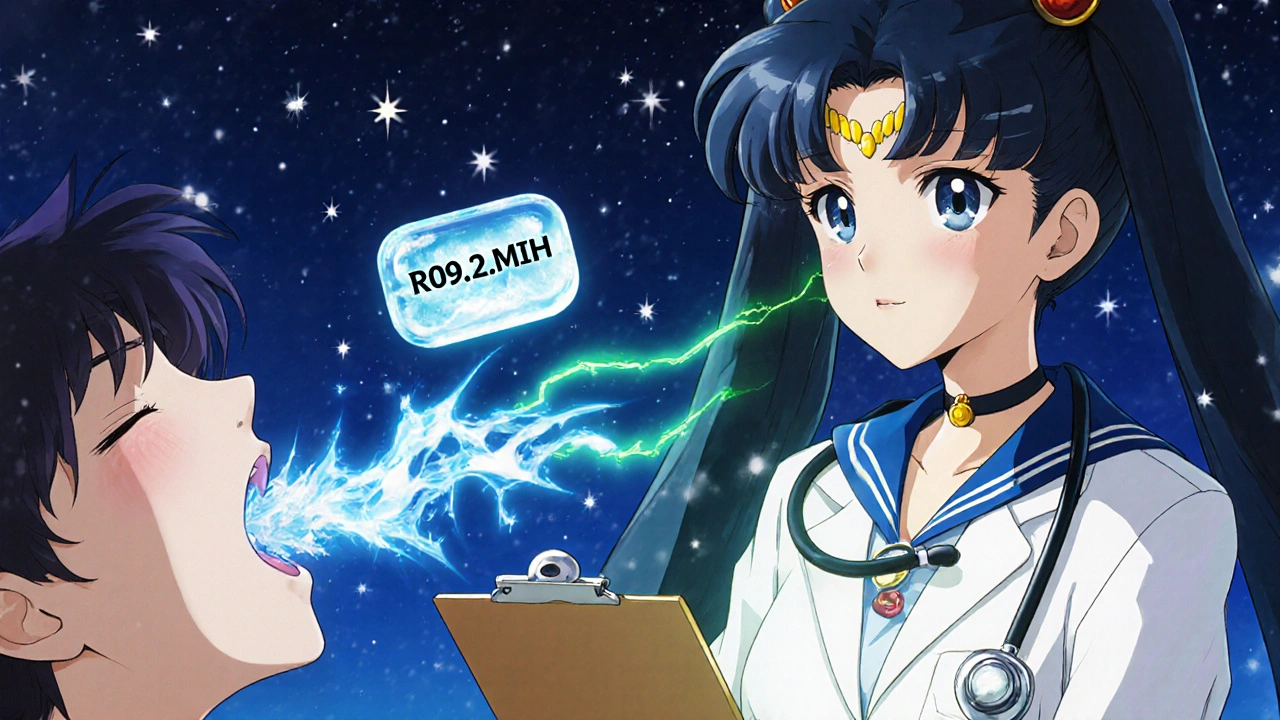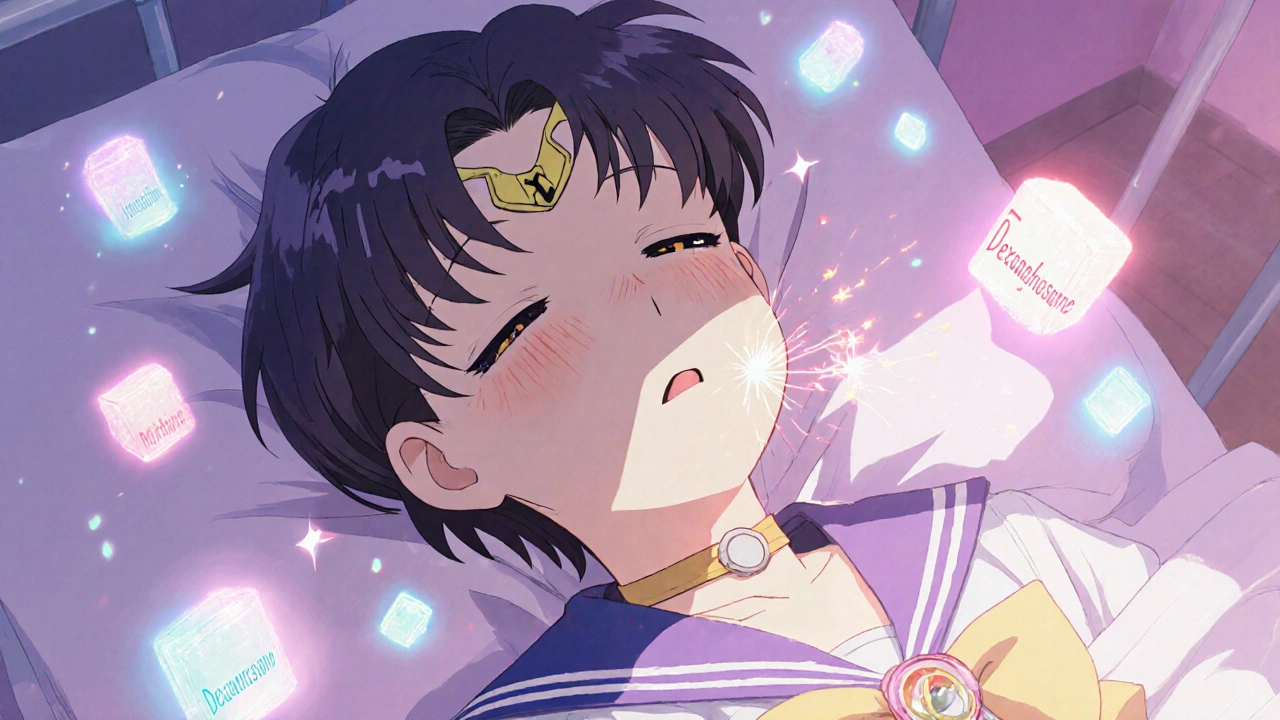Medication-Induced Hiccups Assessment Tool
Quick Assessment Tool
Answer these questions to determine if your hiccups are likely medication-related and what remedies may work best for you.
Assessment Results
Your hiccups appear to be likely medication-induced based on the following factors:
First-Line Remedies
Next Steps
Medical Attention Needed
Ever had hiccups that wouldn’t stop-no matter how many times you held your breath or swallowed sugar? If you’ve recently started a new medication, it might not be coincidence. Medication-induced hiccups are more common than most people realize, and they can turn from a minor annoyance into a full-blown disruption of sleep, eating, and daily life. Unlike the brief hiccup that fades after a few minutes, these last for days, sometimes weeks. And they’re often missed because doctors don’t always link them to drugs.
Why Do Medications Cause Hiccups?
Hiccups happen when the diaphragm spasms suddenly, followed by the vocal cords snapping shut. It’s a reflex controlled by nerves running from your brainstem to your chest. Certain medications mess with this system. They might irritate the vagus or phrenic nerves, change brain chemistry, or swell your stomach enough to trigger the reflex. The biggest culprits? Corticosteroids like dexamethasone and prednisone. In one study, 41% of cancer patients on dexamethasone combined with cisplatin developed hiccups. Even low doses-just 4mg daily-can do it. Benzodiazepines like midazolam, used before surgery, cause hiccups in up to 12% of patients. Opioids like morphine are another common trigger, especially in people using them long-term for pain. The stomach distension from these drugs can push up on the diaphragm, setting off the hiccup reflex. Antibiotics like azithromycin and moxifloxacin are less common, but cases exist. One 2023 report described a man who got nonstop hiccups after starting moxifloxacin for tuberculosis. The pattern is clear: if your hiccups started within hours or days of beginning a new drug, the link is likely real.Who’s Most at Risk?
Men are more likely than women to get medication-induced hiccups, especially from steroids. One study found 97% of cases linked to dexamethasone were male. Age matters too-older adults are more sensitive to drug effects on the nervous system. People with existing nerve damage, like those with diabetes or multiple sclerosis, are also more vulnerable. Cancer patients are a high-risk group. Dexamethasone is routinely given before chemotherapy to prevent nausea. But it often comes with a side effect no one warns you about: hiccups so bad you can’t sleep, eat, or talk. One Reddit user described 72 hours of relentless hiccups after their first dexamethasone dose. On Drugs.com, dexamethasone has a 2.3 out of 5 rating specifically for hiccup side effects, based on 87 reviews.How Long Do They Last?
Most medication-induced hiccups are short-lived-65% go away within 48 hours. But for 30%, they stick around longer than two days. And 5% become intractable-lasting over a month. Persistent hiccups can lead to exhaustion, weight loss, dehydration, and even cracked ribs from the constant spasms. The good news? If the drug is the cause, stopping or lowering the dose often fixes it. But that’s not always possible. Cancer patients can’t just quit dexamethasone. People with chronic pain can’t stop morphine. That’s where targeted treatment comes in.
What Works: Proven Remedies
Before jumping to pills, try simple, evidence-backed home fixes:- Swallow a teaspoon of granulated sugar-this works in 72% of cases, according to a 2021 JAMA study.
- Gargle ice water. The cold shocks the nerves and stops the reflex in 65% of people.
- Hold your breath for 10-15 seconds, then slowly exhale. Repeat 3 times. Success rate: 58%.
- Drink a glass of water quickly while pinching your nose.
Why Doctors Miss It
Here’s the frustrating part: most drug labels don’t list hiccups as a side effect. You won’t find it on the insert for dexamethasone or morphine. That means doctors don’t think to ask. A 2019 study found 35% of medication-induced hiccup cases were misdiagnosed as GERD, anxiety, or even heart problems. The solution? If you get hiccups after starting a new drug, say it out loud. Ask: “Could this be from my medicine?” Use the Naranjo scale-a simple tool doctors use to rate if a drug likely caused a side effect. Answer a few yes/no questions: Did the hiccups start after the drug was given? Did they improve when the drug was stopped? Are there other possible causes?
What to Do If You Can’t Stop the Drug
If you need the medication-for cancer, chronic pain, or autoimmune disease-you don’t have to suffer. Talk to your doctor about:- Switching to a different steroid (like methylprednisolone instead of dexamethasone).
- Adding prophylactic baclofen before your dose.
- Using ondansetron (Zofran) for nausea instead of dexamethasone-some patients report hiccups disappear when they make this switch.
The Bigger Picture
This isn’t just about discomfort. Medication-induced hiccups cost the U.S. healthcare system an estimated $28.7 million a year in unnecessary scans, ER visits, and hospital stays. In 2024, the American Medical Association added a new ICD-10 code-R09.2-MIH-just for medication-induced hiccups. That means doctors will start tracking it properly. The FDA updated dexamethasone’s labeling in 2021 to include hiccups as a “clinically significant adverse reaction.” The European Medicines Agency now requires hiccup data for all new CNS drugs. This is progress. But awareness is still low. A 2023 FDA survey found only 37% of providers correctly identified medication-induced hiccups. That’s why your voice matters. If you’ve had this happen, tell your doctor. Share your story. It’s the best way to make sure others don’t suffer in silence.Can over-the-counter remedies stop medication-induced hiccups?
Yes, some OTC remedies work well. Swallowing a teaspoon of sugar has a 72% success rate in clinical studies. Gargling ice water and holding your breath are also effective for many people. These are safe, quick, and worth trying before turning to prescription drugs. They don’t interfere with your medication and can be done anytime.
Is it safe to stop a medication if it causes hiccups?
Never stop a prescribed medication without talking to your doctor. For some drugs, like steroids or opioids, stopping suddenly can be dangerous. But you can ask if a lower dose is possible, or if there’s an alternative drug with fewer side effects. Your doctor can help you weigh the risks and benefits.
How long does it take for baclofen to work for hiccups?
Most people notice improvement within a few hours to a day after starting baclofen. The standard dose is 5mg three times daily. If no improvement after 48 hours, your doctor may increase the dose. It’s not a quick fix like sugar or ice water, but it’s one of the most reliable long-term solutions for persistent cases.
Why isn’t hiccup listed as a side effect on my drug label?
Many drug labels only list side effects that occurred in at least 1% of clinical trial participants. Hiccups are often underreported because patients don’t mention them, and doctors don’t ask. But real-world data shows they’re more common than trials suggest. The FDA now requires stronger reporting, and newer labels (like dexamethasone’s 2021 update) are starting to include them.
Can hiccups from medication be a sign of something worse?
In rare cases, yes. Persistent hiccups can sometimes signal a stroke, tumor, or infection affecting the brainstem. But if your hiccups started right after beginning a new drug and you have no other neurological symptoms (like weakness, dizziness, or speech issues), the drug is the most likely cause. Still, if they last more than 48 hours, see your doctor to rule out other conditions.

Olivia Currie
November 28, 2025 AT 15:59OMG I thought I was the only one!! Started dexamethasone for my chemo last month and I hiccuped for 72 straight hours. Couldn’t eat, couldn’t sleep, my roommate thought I was having a seizure. Sugar didn’t work, holding breath? Nope. Then my nurse mentioned baclofen and I was like ‘wait, that’s a thing?’ Took 5mg and within 3 hours-POOF. Gone. I’m telling everyone. This needs to be on every med label. 🙏
Curtis Ryan
November 29, 2025 AT 02:42yo i had this same thing after my knee surgery. midazolam gave me hiccups for 3 days. tried everything-sugar, ice water, even scaring myself (yelling at my cat). nothing. then i just stopped panicking and drank a whole glass of water while holding my nose. boom. gone. weird but it worked. also why is chlorpromazine still the only FDA approved thing? that stuff makes you feel like a zombie. baclofen should be #1. also typo: i meant ‘i was like’ not ‘i waz like’ 😅
Rajiv Vyas
November 30, 2025 AT 21:02lol this is all just corporate propaganda. dexamethasone doesn’t cause hiccups. Big Pharma does. They want you to think it’s the drug so you keep taking it and then buy their ‘solution’ baclofen. Who even wrote this? A pharma rep? Hiccups are caused by EMF radiation from 5G towers and the government’s secret mind control satellites. They’re testing nerve reflex suppression on cancer patients. That’s why they don’t list it on the label-because they don’t want you to know the truth. Also, sugar? That’s just glucose poisoning. Drink salt water instead. Real science.
Astro Service
December 2, 2025 AT 00:50What’s next? Are we gonna blame the flu shot for sneezing? Hiccups are just your body being weak. Americans are too soft. In my day, we just held our breath till it stopped. No pills. No fancy science. Just grit. And if you can’t handle a little hiccup, maybe you shouldn’t be on medicine at all. Also, baclofen? Sounds like a Russian spy drug. We don’t need that here.
DENIS GOLD
December 2, 2025 AT 12:27Wow. Another ‘oh no, my drug gave me hiccups’ sob story. Can we get a medal for suffering? Next time, just hold your breath for 10 seconds like a real human. Not everyone needs a 3-page medical essay to stop a hiccup. Also, why is this even on Reddit? This feels like an ad for baclofen. FDA, why are you letting this crap fly? 🙄
Ifeoma Ezeokoli
December 4, 2025 AT 10:15Y’all, I’m from Nigeria and my uncle had this after chemo-same story. But what saved him was this local trick: chew on a piece of dried ginger and sip warm peppermint tea. Not science-y, but it worked. And honestly? We don’t always need fancy meds. Sometimes, community wisdom is just as real. I’m so glad this is getting attention. Hiccups are real pain. And we shouldn’t have to suffer in silence. 🌿❤️
Daniel Rod
December 6, 2025 AT 05:08It’s wild how something so small-like a hiccup-can unravel your whole day. I’ve had them after opioids after surgery. Felt like my body was rebelling. But reading this… it’s not just me. It’s a neurological glitch. And we’re finally starting to name it. That’s huge. 🫂 Baclofen feels like a quiet hero. And sugar? The OG remedy. Sometimes healing isn’t high-tech-it’s just a teaspoon and patience. We’re all just bodies trying to figure out how to live with chemicals. 🤍
gina rodriguez
December 7, 2025 AT 07:31This was so helpful. I’ve been avoiding telling my oncologist about my hiccups because I didn’t want to seem ‘annoying.’ But now I know it’s valid. I’m going to ask about switching to methylprednisolone and trying baclofen prophylactically. Thank you for the practical advice-no fluff, just real options. You made me feel less alone. 💛
Sue Barnes
December 9, 2025 AT 06:29Anyone who takes dexamethasone and gets hiccups is just being dramatic. If you can’t handle a little side effect, you shouldn’t be on powerful meds. This article reads like a pity party. Sugar? Ice water? Please. Real patients endure worse. Stop making everything a crisis. And if you’re on chemo and hiccuping, maybe you’re just not tough enough. Grow up.